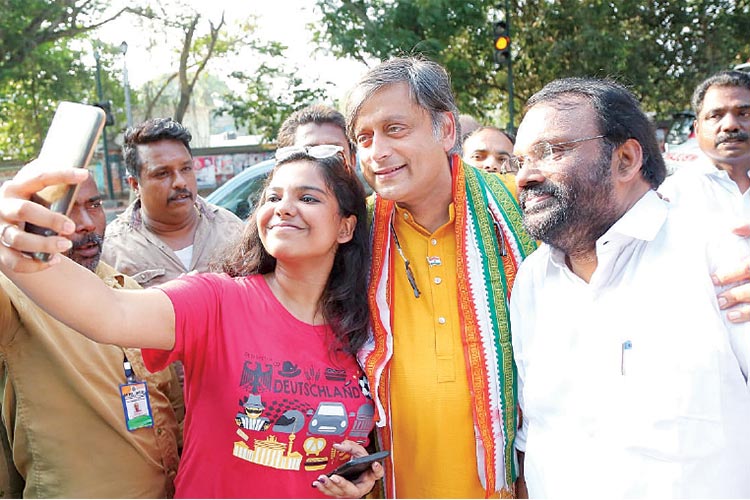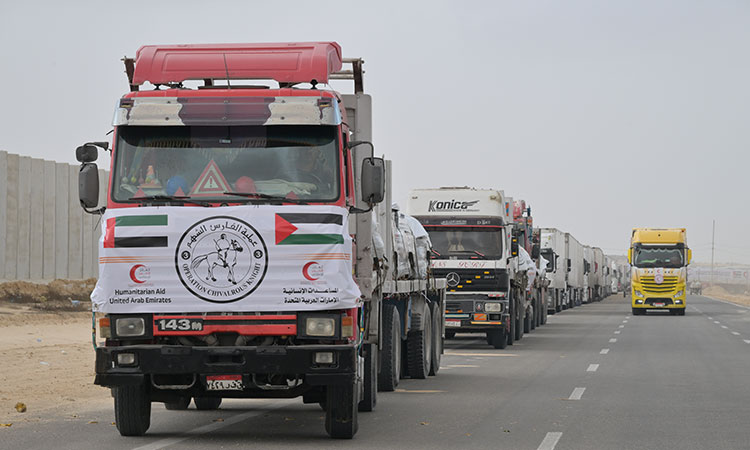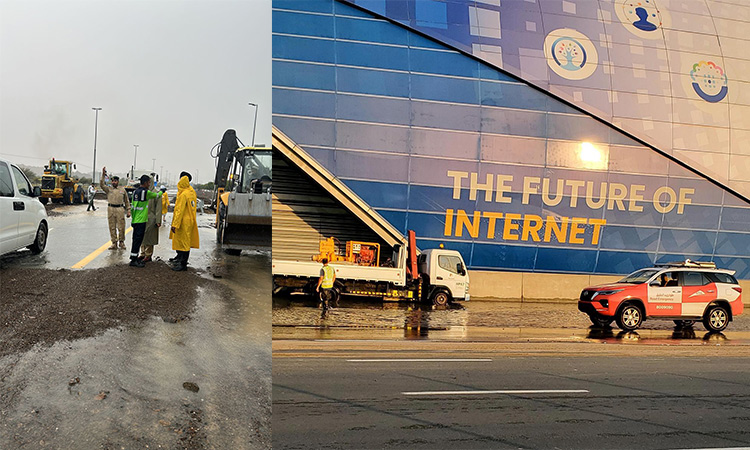Election surveys worry Kerala ruling coalition

Shashi Tharoor campaigns in Trivandrum.
Ashraf Padanna
Trivandrum: The projection of a series of pre-poll surveys by different research agencies is a cause for worry for Kerala’s ruling Left Democratic Front (LDF) if they are to be believed.
All of them show a massive swing of its votes towards the opposition Congress-led United Democratic Front (UDF), in an unprecedented trend in five decades.
Prime Minister Narendra Modi’s Bharatiya Janata Party (BJP) will also benefit from the erosion in the voter base of the LDF led by the Communist Party of India (Marxist) or CPM.
According to the latest survey conducted by the C-Voter for Indo-Asia News Service (IANS), the UDF would walk away with a whopping 46.9 per cent of the popular votes, leaving the LDF way behind at 26.8 per cent.
It projects the BJP-led National Democratic Alliance (NDA) to corner 19.6 per cent votes, four per cent more than what it polled in the 2016 state elections that the LDF swept. Others would get 6.7 per cent.
Translated into seats, the UDF would win 17 seats, leaving the LDF three. The NDA, which is mobilising all its resources into two constituencies - Trivandrum and Pathanamthitta - would continue to draw a blank.
The UDF vote share, according to these surveys, has been steadily increasing and the LDF’s decreasing, over the past four months.
Earlier this month, Voters Mood Research conducted a survey for Times Now television predicting an almost equal number of seats (16) for the UDF leaving three to LDF and one the NDA.
It gave 45 per cent vote share to the UDF, a sharp increase from its findings in January when 38.9 per cent respondents supported the UDF, 29.2 the LDF (26 in January) and 21.7 to the NDA (22 per cent in January).
In between the three months, 13.1 per cent voters who preferred others went down to 4.1 per cent.
In the 2014 national elections, the UDF had cornered 42 per cent votes winning 12 seats and the LDF 40.1 per cent votes and eight seats, including two independents, while 10.82 per cent votes went to the NDA.
Others, including Aam Aadmi Party (AAP), had 7.3 per cent votes.
The Welfare Party of India of the Jama’at-e-Islami is not fielding candidates this time and has started campaigning for the UDF candidates in all the 20 constituencies.
Last month, the survey by A-Z Research Partners for Asianet News also predicted up to 16 seats for the UDF, underlining earlier findings by C-Voter for Republic TV.
It also ranks chief minister Pinarayi Vijayan with 18 per cent approval rating, far below his predecessors Oommen Chandy (24) of the Congress and VS Achuthanandan (20) of his CPM.
It gave the bloc three to five seats and said NDA might win one and open its account for Kerala in the Lok Sabha, the lower house of parliament, for the first time, from the southern part of the state.
The vote share predicted for the UDF was 44 per cent, the LDF 30 per cent and the NDA 18 per cent.
All the surveys cite for its dismal performance the massive Hindu backlash against the LDF dispensation for its Sabarimala policy advocating entry for young women to the hill shrine after Supreme Court lifted the age barrier.
Other contributing factors to the declining LDF support base are political killings and the state government’s failure to rehabilitate thousands of families left homeless in the August floods.
The Republic TV-CVoter survey in December had given the UDF 39.9 per cent vote share and 17 seats as against three seats and 29.1 per cent votes to the LDF while the BJP draws a blank though 19 per cent votes will go into its kitty.
An ABP-CVoter in January also gave 16 seats to the UDF and four to others.
In 2014, the Congress party won eight seats while its partners Indian Union Muslim League (IUML) cornered two and Kerala Congress (M) and Revolutionary Socialist Party (RSP) one each.
The CPM had won four seats and CPI one besides two LDF-backed independents, and both will struggle to retain national party status if they fail to put up a good show, after the rout in West Bengal and Tripura.
They need at least four seats in the Lok Sabha, the lower house of India’s parliament, and six per cent vote share in four states or wins a least two per cent seats elected from three states.



